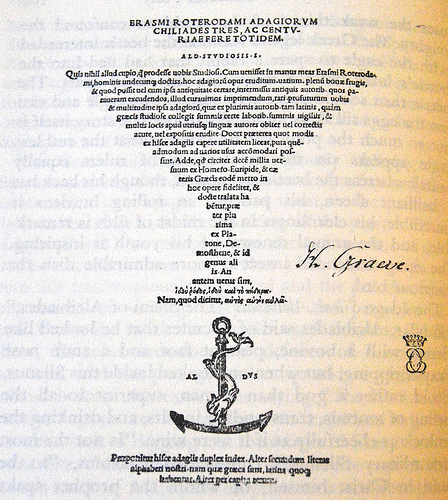|
Teach Fish How To Swim
Teach fish how to swim is an idiomatic expression derived from the Latin proverb . The phrase describes the self-sufficiency of those who know better how to do everything than the experts. It corresponds to the expression, " teaching grandmother to suck eggs". Erasmus attributed the origins of the phrase in his ''Adagia'' to Diogenianus Diogenianus ( el, Διογενειανός, Διογενιανός) was a Greek grammarian from Heraclea in Pontus (or in Caria) who flourished during the reign of Hadrian. He was the author of an alphabetical lexicon, chiefly of poetical words, .... A corollary idiomatic phrase is part of common usage in Chinese ""Muehl, Louis Baker ''et al.'' (1999). 班门弄斧 display one's slight skill before an expert e.g. 在你面前班门弄斧,太不好意思了 (I'm making a fool of myself trying to show off before an expert like you) References {{reflist English phrases ... [...More Info...] [...Related Items...] OR: [Wikipedia] [Google] [Baidu] |
Teaching Grandmother To Suck Eggs
Teaching (your) grandmother to suck eggs is an English language saying that refers to a person giving advice to another person in a subject with which the other person is already familiar (and probably more so than the first person). Origins of the phrase The origins of the phrase are not clear. The Oxford English Dictionary and others suggest that it comes from a translation in 1707, by J. Stevens, of Francisco de Quevedo (Spanish author): "You would have me teach my Grandame to suck Eggs". A record from 1859 is available, implying common usage by that time. Most likely the meaning of the idiom derives from the fact that before the advent of modern dentistry (and modern dental prostheses) many elderly people (grandparents) had very bad teeth, or no teeth, so that the simplest way for them to eat protein was to poke a pinhole in the shell of a raw egg and suck out the contents; therefore, a grandmother was usually already a practiced expert on sucking eggs and did not need any ... [...More Info...] [...Related Items...] OR: [Wikipedia] [Google] [Baidu] |
Erasmus
Desiderius Erasmus Roterodamus (; ; English: Erasmus of Rotterdam or Erasmus;''Erasmus'' was his baptismal name, given after St. Erasmus of Formiae. ''Desiderius'' was an adopted additional name, which he used from 1496. The ''Roterodamus'' was a scholarly name meaning "from Rotterdam", though the Latin genitive would be . 28 October 1466 – 12 July 1536) was a Dutch philosopher and Catholic theologian who is considered one of the greatest scholars of the northern Renaissance.Gleason, John B. "The Birth Dates of John Colet and Erasmus of Rotterdam: Fresh Documentary Evidence", Renaissance Quarterly, The University of Chicago Press on behalf of the Renaissance Society of America, Vol. 32, No. 1 (Spring, 1979), pp. 73–76www.jstor.org/ref> As a Catholic priest, he was an important figure in classical scholarship who wrote in a pure Latin style. Among humanists he was given the sobriquet "Prince of the Humanists", and has been called "the crowning glory of the Christian human ... [...More Info...] [...Related Items...] OR: [Wikipedia] [Google] [Baidu] |
Adagia
''Adagia'' (singular ''adagium'') is the title of an annotated collection of Greek and Latin proverbs, compiled during the Renaissance by Dutch humanist Desiderius Erasmus Roterodamus. Erasmus' collection of proverbs is "one of the most monumental ... ever assembled" (Speroni, 1964, p. 1). The first edition, titled ''Collectanea Adagiorum'', was published in Paris in 1500, in a slim quarto of around eight hundred entries. By 1508, after his stay in Italy, Erasmus had expanded the collection (now called ''Adagiorum chiliades tres'' or "Three thousands of proverbs") to over 3,000 items, many accompanied by richly annotated commentaries, some of which were brief essays on political and moral topics. The work continued to expand right up to the author's death in 1536 (to a final total of 4,151 entries), confirming the fruit of Erasmus' vast reading in ancient literature. Commonplace examples from ''Adagia'' Some of the adages have become commonplace in many European langua ... [...More Info...] [...Related Items...] OR: [Wikipedia] [Google] [Baidu] |
Diogenianus
Diogenianus ( el, Διογενειανός, Διογενιανός) was a Greek grammarian from Heraclea in Pontus (or in Caria) who flourished during the reign of Hadrian. He was the author of an alphabetical lexicon, chiefly of poetical words, abridged from the great lexicon () of Pamphilus of Alexandria (AD 50) and other similar works. It was also known by the title (“Manual for those without means”). It formed the basis of the lexicon, or rather glossary, of Hesychius of Alexandria, which is described in the preface as a new edition of the work of Diogenianus. A collection of 776 proverbs under his name is still extant bearing the name Παροιμίαι δημώδεις ἐκ τῆς Διογενιανοῦ συναγωγῆς, probably an abridgment of the collection made by himself from his lexicon (ed. by Ernst von Leutsch and Friedrich Wilhelm Schneidewin in ''Paroemiographi Graeci'', i. 1839). Diogenianus was also the author of an "Anthology of epigrams about rive ... [...More Info...] [...Related Items...] OR: [Wikipedia] [Google] [Baidu] |

.jpg)
